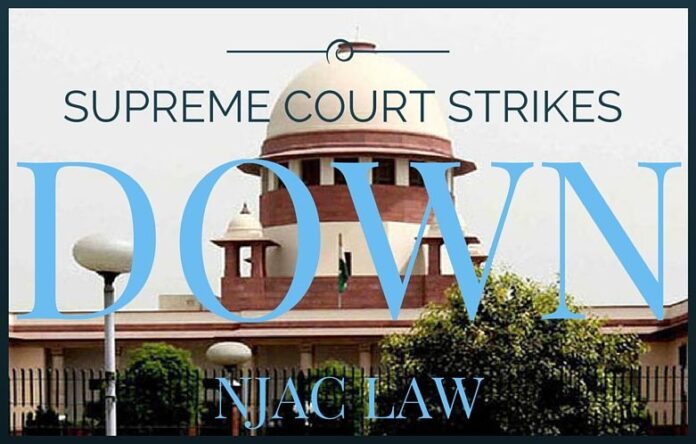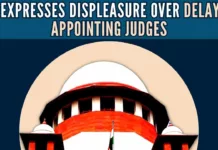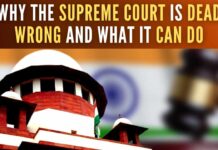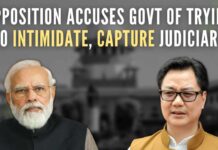
Navin Upadhyay
New Delhi, Oct 16
BJP says it’s a setback to Parliamentary sovereignty.
| Title | Description |
|---|---|
| COLLEGIUM SYSTEM | A collegium comprising the Chief Justice of India and four senior most judges of the Supreme Court (SC) will appoint judges of the SC on the basis of recommendation made by the Chief Justice of the High Courts. The names will be sent for clearance to the Union law minister. If he has any objection, he can return them for reconsideration to the collegium, which can either entertain his objection or overrule it. In case of appointment of judges for the High courts, the collegium will consist of the Chief Justice of India and two senior most judges of the SC. |
| NJAC ACT | A six–member committee was proposed to decide the appointment of judges. The panel was to consist of Chief Justice of India, two senior most judgment of the Supreme Court, Union Law minister and two eminent persons. |
[dropcap color=”#008040″ boxed=”yes” boxed_radius=”8px” class=”” id=””]I[/dropcap]n a major setback to the political establishment of the cuntry, the Supreme Court on Friday quashed the controversial National Judicial Appointment Commission (NJAC) ACT and restored the two-decade old collegium system upholding the supremacy of the judiciary in making appointment of judges to the high courts and the apex court. The stage is now set for a bitter confrontation between the judiciary and the executive. The BJP has said that SC decision to strike down NJAC is a “setback to Parliamentary sovereignty.”
“The prayer for reference to a larger bench, and for reconsideration of the Second and Third Judges cases of 1993 and 1998 respectively is rejected. The Constitution (Ninety-ninth Amendment) Act, 2014 is declared unconstitutional and void.” The judgment said, adding, “The National Judicial Appointments Commission Act, 2014, is declared unconstitutional and void.
“The system of appointment of Judges to the Supreme Court, and Chief Justices and Judges to the High Court’s; and transfer of Chief Justices and Judges of High Courts from one High Court, to another, as existing prior to the Constitution (Ninety-ninth Amendment) Act, 2014 (called the “collegium system”), is declared to be operative,” the bench said.
[dropcap color=”#008040″ boxed=”yes” boxed_radius=”8px” class=”” id=””]T[/dropcap]aking note of the criticism of the collegium system, the Court said it was ready to take suggestions for improving the system , posting the hearing for November 3. “To consider introduction of appropriate measures, if any, for an improved working of the ‘collegium system’, the matter is listed on November 3.” The judgment said,.
The prayer for reference to a larger bench, and for reconsideration of the Second and Third Judges cases of 1993 and 1998 respectively is rejected.
After today’s verdict, the government has the option of either filing a review petition before the Supreme Court or bring in a new law to stop the operation of the collegeium system. In his first reaction, Attorney General Mukul Rohtagi said the judgment was so comprehensive that there was not much scope to challenge it under a review petition.
If the Government did not file review petition and decided to enact a new law to curb the SC’s power to appoint judges, it will pick up a direct confrontation with the judiciary..
The verdict flies in the face of the concerted bid by political parties and the NDA government to give a major role to the government in appointing judges to the highest judiciary by including the Union Law minister and two eminent persons in the selection panel along with Chief justice of India and two other senior most Supreme Court judges.
[dropcap color=”#008040″ boxed=”yes” boxed_radius=”8px” class=”” id=””]I[/dropcap]n a 4-1 verdict, the five-judge bench also declared as unconstitutional the 99th amendment to the Constitution to bring in the Act to replace the collegium system.
Stung by the judgment the government took the stand that the Supreme Court has gone against the will of the people since the Act was backed by the entire parliament and twenty state governments has endorsed. In taking this bizarre stand, the Government forgot that the SC was not political establishment which had any obligation to judge a legislation on the basis of support it enjoyed either among parlimantarians or the people.
“There was unanimous support for it (the two bills) in the Lok Sabha and the Rajya Sabha. There was one walkout in the Rajya Sabha (during voting), “ Union Telecom minister Ravishnakr Prasad said. Prasad was the law minister when the NJAC act was endorsed by the parliament.
In taking this bizarre stand, the Government forgot that the SC was not political establishment…
“Twenty state assemblies had ratified it… The principal author of the 1993 Supreme Court judgment (which led to the collegium system) (late) Justice J S Verma had also suggested a serious rethink on the collegium system and so had Justice V R Krishna Iyer,” the Telecom Minister said.
[dropcap color=”#008040″ boxed=”yes” boxed_radius=”8px” class=”” id=””]L[/dropcap]aw Minister D V Sadananda Gowda also took similar views saying, “ I’m surprised at the verdict of the Supreme Court. Will of the people had been brought to the court. We will consult senior colleagues and the Prime Minister and take a decision.”
The bench of justices J S Khehar, J Chelameswar M B Lokur, Kurian Joseph and A K Goel also turned down the plea of the Central government to refer for review to a larger bench the 1993 and 1998 verdicts of the apex court on the appointment of judges to the higher judiciary.
Of the five judges, four declared as “unconstitutional” the 99th constitutional amendment, four judges declared it as unconstitutional while Justice J Chelameswar differed with them and gave his own reasons for upholding its validity. However, he said that in view of the majority decision, he did not see any useful purpose in examining the constitutionality of the ACT (NJAC).
[dropcap color=”#008040″ boxed=”yes” boxed_radius=”8px” class=”” id=””]J[/dropcap]ustice Khehar, who pronounced the judgment for the bench, said that it was difficult to hold that the wisdom of appointment of Judges can be shared with the political-executive. “ In India, the organic development of civil society, has not as yet sufficiently evolved. The expectation from the judiciary, to safeguard the rights of the citizens of this country, can only be ensured, by keeping it absolutely insulated and independent, from the other organs of governance. In our considered view, the present status of the evolution of the “civil society” in India, does not augur the participation of the political-executive establishment, in the selection and appointment of Judges to the higher judiciary, or in the matter of transfer of Chief Justices and Judges of one High Court, to another,” he said.
“We are of the view, that consequent upon the participation of the Union Minister in charge of Law and Justice, a Judge approved for appointment with the Minister’s support, may not be able to resist or repulse a plea of conflict of interest, raised by a litigant, in a matter when the executive has an adversarial role. In the NJAC, the Union Minister in charge of Law and Justice would be a party to all final selections and appointments of Judges to the higher judiciary. It may be difficult for Judges approved by the NJAC, to resist a plea of conflict of interest (if such a plea was to be raised, and pressed), where the political-executive is a party to the list. The above, would have the inevitable effect of undermining the “independence of the judiciary”, even where such a plea is repulsed
[dropcap color=”#008040″ boxed=”yes” boxed_radius=”8px” class=”” id=””]E[/dropcap]specially keeping in mind the enormity of the participation of the political-executive, in actions of judicial adjudication. Reciprocity, and feelings of pay back to the political-executive, would be disastrous to “independence of the judiciary”… In this, we are only reiterating the position adopted by Dr. B.R. Ambedkar. He feared, that with the participation of the political-executive, the selection of Judges, would be impacted by “political pressure” and “political considerations”… It is in this background, that it needs to be ensured, that the political-executive dispensation has the least nexus, with the process of finalization of appointments of Judges to the higher judiciary.”
- The rise of Patanjali:An Indian yogi’s challenge to MNC giants - January 26, 2016
- Padmas – a blend of excellence, politics and ideology - January 25, 2016
- Scared of hispopularity, British wanted to hang Netaji - January 24, 2016











It is not necessary that you always amput the deceased portion,instead give it medicine.the most dangerous of NJAC is the presence of Law Minister & two unknown eminent persons on its panel. As for nod of several state government, politicians irrespective of parties generally come on one platform on such issues. Many politicians are irked by the decisions of courts at state & centre level.
As for lacunae in collegium system, I favour preparation of in-depth parameters(you may call it indicators) for perfect evaluation for the judges being considered for elevation. In fact some voices had come recently that performance of judges on bail, adjournment,stay 7 time taken be considered by the collegium for promotion.